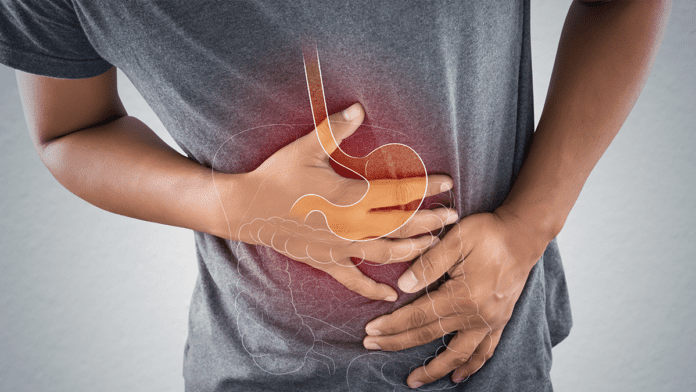Gastroenteritis is also known as “stomach flu”, although it has no link with influenza. Gastroenteritis is a condition that often manifests with diarrhea and vomiting. When you have gastroenteritis, your stomach and intestines are irritated and inflamed. Gastroenteritis is usually of viral or bacterial origin.
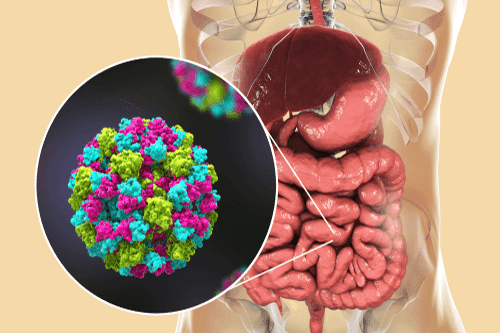
Introduction
Gastroenteritis is a short-term condition caused by the infection and inflammation of the gastrointestinal tract, and is usually by an infective cause. It is called other names such as include stomach flu, stomach bug, gastric flu, stomach bug, stomach virus, and gastrointestinitis. It is mostly transient, lasting for a few days.
It is marked by diarrhea and vomiting which may be accompanied by abdominal cramps and fever. It could later result in dehydration due to severe diarrhea and vomiting. However, it can be prevented if the fluid lost is replaced by drinking fluids. If severe, an infected person may be placed on a drip (a way of administering intravenous fluid directly into the bloodstream).
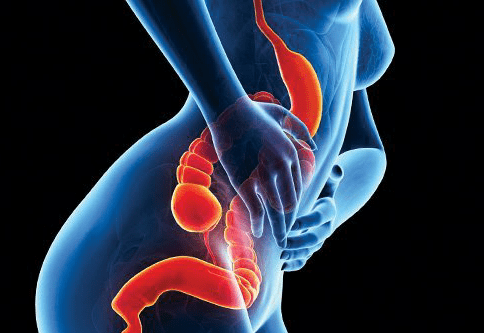
Risk factors for gastroenteritis include poor food handling and cooking, low immunity, and poor personal hygiene. Gastroenteritis can be caused by any of the following; viruses, bacteria, bacterial toxins, parasites, chemicals, metals, and some drugs.
Causes of Gastroenteritis
Gastroenteritis can be caused by many biological and chemical agents. It is mostly caused by viruses. Viral gastroenteritis accounts for about 50-70% of all cases of gastroenteritis in developed countries. The two main viruses are rotavirus and norovirus. Rotavirus is the most common cause of gastroenteritis in infants and young children. Globally, it is the most common cause of diarrhea in that age group. However, Norovirus is the most common cause of severe gastroenteritis and other foodborne diseases in the United States, especially among adults. Other viruses that cause gastroenteritis include astrovirus, calicivirus, and adenovirus.
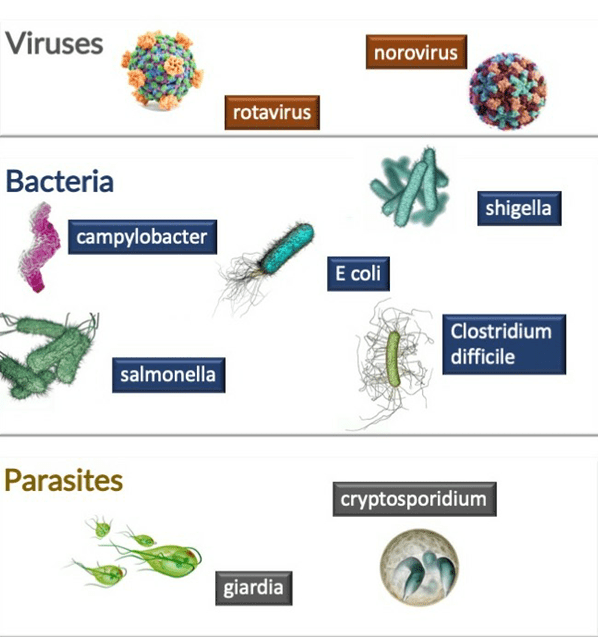
Other causes include:
Bacteria
They account for 15-20% of gastroenteritis cases in the United States.The most common causes of bacterial gastroenteritis are salmonella and campylobacter. They are often spread via eggs, undercooked chicken or turkey, live poultry, and pet reptiles. Bacteria such as Escherichia coli (E. coli) and shigella can also cause it. It can be transmitted from person to person and via contaminated foods, water, and drinks.
Parasites
Although uncommon, parasites like giardia and cryptosporidium can cause gastroenteritis. They account for 10-15% of gastroenteritis cases in the United States.They can be found in contaminated swimming pools, foods, and water. Another parasite is Entamoeba histolytica present in food and water contaminated with feces.
Other sources include:
- Heavy metals in drinking water. Examples include mercury, lead, arsenic, and cadmium. They can all trigger gastroenteritis via food poisoning.
- Bacterial Toxins. The bacteria that release these poisonous substances do not cause gastroenteritis themselves. However, the substances they produce can irritate or inflame the digestive tract. They are mostly ingested through contaminated food, especially seafood. Examples are the toxins from some strains of Staphylococci (Staphylococcus aureus), Bacillus cereus, Clostridium perfringes, and Vibrio cholera.
- Medications. In immune-compromised people, medications can trigger gastroenteritis. These medications include antibiotics, laxatives, antacids, colchicine, quinidine, sorbitol, cholinergics, proton pump inhibitors (PPIs), and chemotherapy drugs.
Causes of infectious gastroenteritis
Infectious gastroenteritis is caused by biological agents like viruses, bacteria, and parasites. The following are common types of infectious gastroenteritis and how they are caused and/or spread:
Viral gastroenteritis
From the name, it is caused by a virus, usually rotavirus or norovirus. It is mostly transmitted from person to person through contact with contaminated hands, vomit, and feces. Infection can also be caused by ingesting contaminated food or water.
Salmonellosis
Gastroenteritis is caused by the bacteria, salmonella. The bacteria are present in animal feces. A person can be infected from handling infected animals, eating contaminated food, and contact with contaminated hands and surfaces.
Campylobacter infection
Campylobacter is found in animal feces and uncooked poultry and meat. A person can be infected by not washing hands properly after handling infected animals. Also, eating contaminated food and undercooked meat, especially poultry can cause infection.
Escherichia coli infection
This infection is common among travelers to countries with poor sanitary practices. Contaminated water, contaminated raw fruits, and vegetables are major routes of transmission.
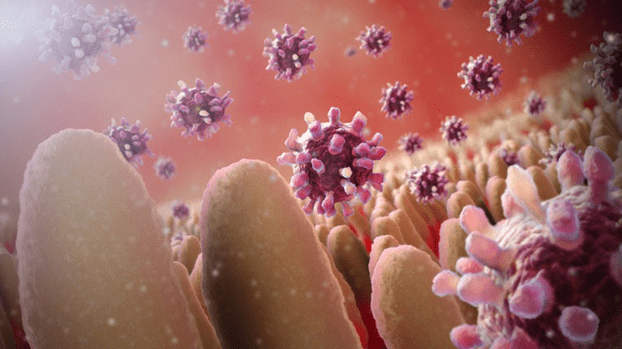
Shigellosis
Shigella is found in human feces. Shigella can be spread through unwashed hands after going to the toilet or changing a diaper. Those contaminated hands may spread the bacteria to food or surfaces.
Giardiasis
This infection is caused by a parasite. The parasite can be gotten or spread from unwashed hands after going to the toilet, after changing the diaper of an infected baby, or handling infected animals. Drinking contaminated water can cause infection too.
Cryptosporidium infection
Cryptosporidium is found in the intestines of humans and animals. This type of gastroenteritis can be caused by accidentally drinking water in contaminated swimming pools. It can also be via contact with infected animals. It can be spread from person to person and surfaces via unwashed contaminated hands.
Causes of non-infective gastroenteritis
These are often caused by conditions like:
Radiation colitis
Gastroenteritis caused by radiation therapy.
Inflammatory bowel disease
Examples include Crohn’s disease or ulcerative colitis.
Microscopic colitis
A condition where the number of inflammatory cells in the colon is high shown only via a biopsy.
Chronic ischemic colitis
A condition caused by a disruption in blood supply to the colon (large intestine).
Symptoms of Gastroenteritis
When you have gastroenteritis, the main symptoms you will notice are watery diarrhea and vomiting. Other symptoms include;
- Abdominal pain
- Abdominal cramps
- Fever
- Nausea
- Weakness
- Headache
- Loss of appetite
- Bloating
- Blood in stools (in some cases)
- Pus in the stool (few cases)
- Dehydration. This can be manifest as:
- feeling very thirsty
- producing lesser quantities of urine ( for babies, not wetting their diapers for three hours or more)
- producing dark-colored urine
- sunken cheeks
- sunken eyes
- dizziness
- dry skin and mouth
- Body aches
Medications for Gastroenteritis
Fluid replacement therapy
This is the primary line of treatment, especially for viral gastroenteritis. For viral gastroenteritis, medical treatment is often not necessary. Fluid therapy is aimed at preventing or treating dehydration by replacing fluids and electrolytes (sodium and potassium).
This includes drinking plenty of clear fluids, oral rehydration therapy as well as intravenous fluid replacement. Examples of clear fluids include water, sports drinks, fruit juices, and broth. You may eat saltine crackers as well. Oral rehydration solutions are liquids that contain water, electrolytes, and glucose. Examples include Pedialyte.
Antibiotics
These drugs are only used for infections that are of bacterial origin. They either stop the growth of or kill the bacteria. Drugs include Penicillin, Metronidazole (Clostridium difficile), Amoxicillin (salmonella), Azithromycin (Shigella), or ceftriaxone (salmonella, shigella), third-generation cephalosporins among others.
Antiemetics
These groups of drugs are used to stop or control severe vomiting. However, they should be used only if prescribed. A good example is ondansetron. Others include promethazine (Phenergan) and trimethobenzamide (Tigan).
Antidiarrheals
These classes of drugs help reduce or control the frequency of diarrhea. For gastroenteritis, you may use drugs like loperamide (Imodium) and bismuth subsalicylate (Pepto-Bismol). They must be prescribed. Also note that while they relieve symptoms, they do not treat the underlying cause of the infection.

Surgeries for Gastroenteritis
Gastroenteritis can be successfully treated with medications. However, if it was caused by certain gastrointestinal disorders like Crohn’s disease and ulcerative colitis, you may need surgery. These surgeries include:
Laparoscopic surgery
This surgery requires the use of a laparoscope. Small incisions (about three or more) are made in the abdomen. These keyhole incisions are used as ports where the laparoscope and other surgical instruments are inserted. The laparoscope transmits images that allow the surgeon to operate. This surgery can be done for operations like total abdominal colectomy (ulcerative colitis) and right colectomy or ileocolectomy (Crohn’s disease)
Hand-assisted laparoscopic surgery (HALS)
In this surgery, an incision of three to four inches is made in the abdomen for the surgeon’s hand to access the abdominal organs
Lifestyle Changes for Gastroenteritis
If you have gastroenteritis, here are some lifestyle changes that may help relieve your sy, symptoms:
Give your stomach time
Take a break from strong, solid foods and give your stomach time to settle.
Eat an easy-on-the-body diet
Eat bland, easy-to-digest foods. Examples include crackers, bananas, gelatin, toast, rice, etc. Some refer to it as the BRAT diet (bananas, rice, applesauce, and toast). Stop eating if you feel nauseous. Avoid foods like dairy products (milk, cheese, and yogurt), alcohol, caffeine, chocolate, fatty and spicy foods.
Drink plenty of fluids
Drink plenty of fluids in form of clear soda, broth, and sports drinks. Take small, frequent sips so you do not get nauseous.
Get enough rest
Gastroenteritis and consequently, dehydration can make you weak. Take out time to rest well.
Use medications as prescribed
Do not take drugs without the prescription of your doctor. If you want to use any over-the-counter medications, tell your doctor firsthand. Drugs like ibuprofen and aspirin can irritate your stomach
Prevention of Gastroenteritis
Some measures that individuals and households can take to prevent gastroenteritis include:
Hand washing
This is still the best preventive measure against infections. Always wash your hands with soap and water especially after the following:
- After using the toilet
- After changing a baby’s diapers
- After handling animals
- After you come in from places like farms, markets and generally, outside.
- Before eating
- Before preparing food
- After using a tissue or a handkerchief
- After smoking

Proper food preparation and storage
Wash raw fruits and vegetables thoroughly under running water. Also, make sure that foods such as meat and poultry are thoroughly cooked. Do not use the same utensils (knives, spoons, chopping boards, etc.) to handle both raw and cooked food. If you will, ensure they are properly washed between uses. To prevent the growth of bacteria, keep cold foods at temperatures below 5°C and hot foods above 60°C.
Proper cleaning and washing
This covers the following:
- Equipment and utensils: Ensure all kitchen equipment and utensils are clean before use. If they are used for raw foods and vegetables, ensure they are properly washed and cleaned before outing away.
- Surfaces: Clean surfaces regularly- tables, shelves, kitchen tops, baby tables, nappy change tables, etc. For surfaces that may have been contaminated with infected stool or vomit, clean with a mixture of 5 to 25 tablespoons of household bleach and 1 gallon of water.
- Clothes: Contaminated clothes should be washed with detergent and set to the longest cycle on the machine. Once washed and rinsed, machine dry them.
- Toilets and Bathrooms: Wash toilets with antibacterial toilet cleaners, bleaches, and soaps. Clean toilet seats, bathtubs, door handles, and taps regularly.
- Others: include children’s toys, door handles, window sills, flower vases, etc.
Instead of cloth towels, use disposable paper towels to dry your hands. This is because microorganisms like viruses and bacteria can survive on objects for some time.
Safety when traveling
When traveling to countries with poor or questionable sanitation, stick to bottled water. Bottled water should be your go-to for drinking, brushing teeth, and washing hands, especially to eat. Also, avoid vegetables, peeled fruits, uncooked foods, ice in drinks, and food buffets.
Immunization
There are vaccines that infants receive by mouth to protect against rotavirus. Rotavirus vaccines come in two brands RotaTeq and Rotarix.
Stay at home
When you feel or are sick, stay at home until 48 hours after symptoms have stopped. If symptoms persist, visit your GP.
Consequences of Untreated Gastroenteritis
Gastroenteritis rarely causes complications in healthy adults and is self-limiting, lasting for some days to a week. Infants, younger children, and older adults are, however, susceptible to symptoms and may develop complications.
Severe infections can result in the following:
Dehydration
This is the most common complication of gastroenteritis. It is particularly fatal for younger children, older adults, and immunocompromised persons. Dehydration can result in more severe issues like renal failure, kidney stones, urinary tract infections (UTIs), seizures, heat injury, and hypovolemic shock.
Changes in your gut microbiota
Long-term, untreated gastroenteritis can change the type of bacteria you have in your intestines and decrease the number of beneficial ones.
Post-infectious IBS
IBS is irritable bowel syndrome. Symptoms of post-infectious IBS include diarrhea, abdominal cramps, constipation, and nausea. These symptoms can persist for months till years.
Colitis and Crohn’s disease
Some people can go on to develop Crohn’s disease or colitis if gastroenteritis is left untreated. These conditions cause inflammation of your intestines, bloody diarrhea, and associated symptoms.
Malabsorption
This occurs because the guts cells are destroyed over time. As such, the reabsorption of water and other nutrients can be affected. This results in persistent diarrhea.
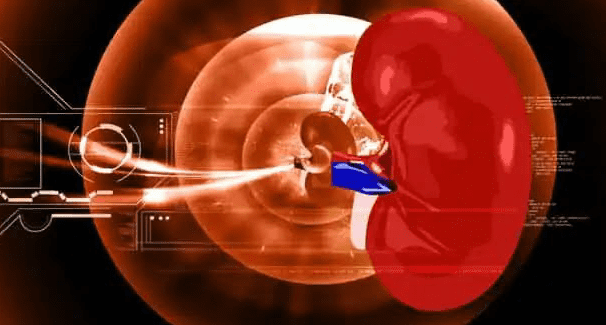
Acute kidney/renal failure
This is one of the most common conditions that people with long-term gastroenteritis develop. This is due to hypervolemia. There is a decrease in the volume of fluid filtered by the kidneys and waste is not properly excreted. You are unable to produce adequate quantities of urine, you feel weak and there can be edema or swelling. If not treated in time, it can be very fatal.
Hemolytic-uremic syndrome
Gastroenteritis caused by a strain of E. coli is associated with this condition. It is rare and found to affect mostly children. In this condition, there is anemia, thrombocytopenia (low platelet count), and renal failure.
Reduced effectiveness of medications
This is due to the vomiting and diarrhea that makes lesser doses of those medications to be absorbed.
Other complications include:
- Systemic infections like reactive arthritis, meningitis, and pneumonia. They are peculiar to Salmonella infections.
- Chronic diarrhea
- Transient lactose intolerance
- Sepsis, especially infections caused by Salmonella and Campylobacter.
- Intestinal bleeding
- Toxic megacolon
- Anemia
- Brain damage
- Death
Conclusion
Sources:
Gastroenteritis is a very common condition. It can either be of infectious or non-infective origin. Viruses account for most cases of gastroenteritis. It can be self-limiting with symptoms disappearing within days. However, if symptoms persist, see your doctor as untreated gastroenteritis has severe complications including dehydration and death.
Better Health Channel. https://www.betterhealth.vic.gov.au/health/conditionsandtreatments/gastroenteritis
Cleveland Clinic. https://my.clevelandclnic.org/health/diseases/12418-gastroenteritis
WebMD. https://www.webmd.com/digestive-disorders/gastroenteritis


